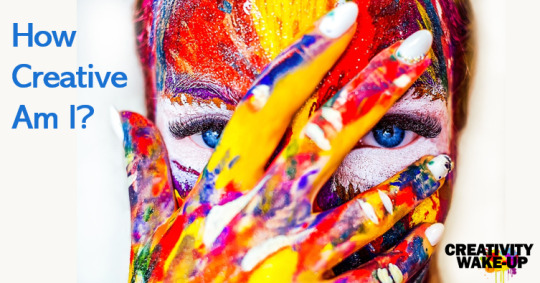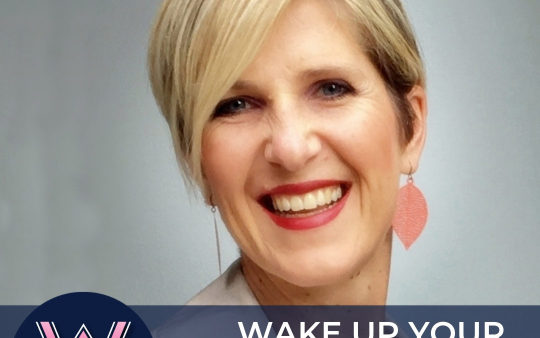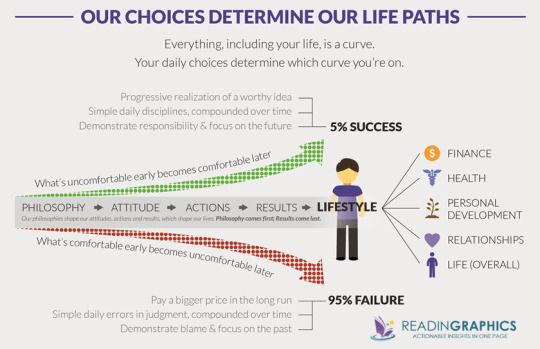Text
How creative am I?

As leaders, as managers, as parents, as contributors to society, we know that creative thinking is an increasingly important skill in this VUCA world. So you may be asking yourself, how creative am I, really? Will I cut it? Do I need to sharpen up?
Firstly let me be clear: by creativity, I don't mean being able to draw. If you've ever said: "I can't draw a stick man" or "I don't have a creative bone in my body" then you've been referring to artistry. Visual, literary and performing arts all take a level of creativity but they don't define it. Creativity is more than artistry. It is the application of imagination to solve a problem or create something useful. So you can struggle drawing stick men, but be a brilliant problem solver and a true creative thinker.
So, how creative are you? If you are a human being, you are creative. That's a given. It's how our brains are wired. But as for how creative are you at this point in time… this depends on what you've been doing with the superstructure in your skull for the years you've been alive. If you're like most adult humans, you have stacked and boxed most of your creative desires, curiosities and passions in a neat mental filing cabinet, labelled Ancient History or For Children Only and let them grow dusty and rusty. You've been trained through your primary education to write in monochromatic (monotonous to your brain) blue or black pen, on straight horizontal lines (akin to prison bars for your mind, according to Tony Buzan.) No doubt, you have continued this straight-jacketed habit, as have I, for most of your adult life.
If at this point, you're thinking, "Are there other ways to write things down that don't involve straight lines and black pen?" then your creativity may be somewhat asleep. If you are wracking your brain trying to recall those imaginary lives you dreamed of when you were young and struggling to locate your true passions now, then I'm afraid your creativity may be in a deep sleep or even a in a coma.
The question you should be asking yourself is not, "How creative am I?", but "How creative am I, now?" I believe that the answer to the first question is the same for all of us: infinitely! I don't think that there is an end to how creative any of us can become. The good news is that developing our creativity is both a process of peeling off what's stopping our creativity, as well as building in skills, habits, practices and influences to grow our creativity. "How creative am I now?" helps us understand our starting point and hopefully give us the impetus to get going on our creative journey.
Here are a few more questions to help you gauge how creative you are now.
Do you lean in to discomfort, or tend to take the easy option?
Do you flick to your phone calculator rather than add up the bill in your head?
Do you ever change up your surroundings or do you like to keep things the same?
Do you learn about varied and different things or just stick to the basics you need in your industry or role?
Do you record your dreams or not recall them at all?
Do you immediately google anything you want to know, or try to recall it or ask a friend?
Do you challenge yourself
Do you ever experiment with cooking or stick to what you know?
Do you take different routes back from work or stay with familiar routes?
There are many more, but these should hint at how creative you really are being in this season of your life. You may even be a talented artist, but have become stunted or stale in your creativity. Creative minds are dynamic and energised, and need to be continually stretched and challenge not to stagnate.
0 notes
Text
Working Women’s Wealth Podcast interviews Nina Pearse
Nina Pearse was recently interviewed by Lisa Linfield for the Working Women’s Wealth Podcast. We would love to share some excerpts from the interview with you. Lisa has an impressive goal to teach 1 million women about money. She speaks to companies, women’s groups and entrepreneurs about how to lead their best life possible by reaching their financial goals.

Lisa Linfield: Thanks for joining us, Nina. You have a fantastic story about finding your passion and purpose and stepping into a future with so much potential. Tell us a little bit about your journey.
Nina Pearse: I started out in finance and accounting. I worked in banking for a while and then quickly realized that I didn’t want any of those jobs for myself. I moved into what I loved as a child. I would often looked up at a teacher and thought that was what I’d like to do. I decided not to go into school teaching but into adult learning and development. I’ve now worked in that field for about twenty years. I started out in SAP training. I then moved to Delloite and worked in People and Change. I worked in Dimension Data for many years in Human Resources, looking after the Leadership Forum and Employee Engagement. For the last six years I’ve have been designing and facilitating learning for leaders and managers as an associate with Conamara and with Ceed, a Digital Learning Company. I’ve learned a lot there and loved what I have been doing. I’ve worked with awesome people, but I’ve had a feeling growing within me that I want more. I have more to give and I have more of a specific purpose. That’s what lead me to start thinking about my own venture.
Lisa: You have now molded and shaped a company called Creativity Wake-Up. You provide courses where you lead leaders, executives, business owners, really anybody through a process of waking-up their creativity. What has been the biggest thing that you have needed to learn to get from a stage of “I think I need to do something” to actually having implemented the course?
Nina: I think it has been a big shift in mind-set and that has come through probably a few influences, one of them being a book called The Slight Edge, brought for me by my husband. It completely shifted how I think about things. The Slight Edge is about how we are all on a journey and the most powerful force behind that journey is time. According to the author, Jeff Olson, time is always working for or against you. He says that this applies to every area of your life whether it be fitness, health, wealth or personal development. Unless you are focusing on your habits and aware that what you do every day matters, the negative habits can compound over time. He says that no one goes broke or becomes unfit overnight. It is those tiny little decisions that you make every single day that lead you to that point.

An example of this is everyday lunch time choices. Do you buy an Energade spending R20 or $5, or do you have the free water that is offered at the office? What is the impact of that choice? Will it matter today if I have the Energade? No, it’s not going to really matter today, but over time it will have a big impact. Every time you make that decision you are first of all spending that money that you could have been spending elsewhere. You are also filling your body with sugar which is going to make you a bit hungry in the afternoon which is going to make you eat a bit more each day. It’s going to get your brain more addicted to that sugar and so on. It’s the tiny things that are so mundane and small, but they make a big difference in the long term. This concept started shifting my mind because I looked at people around me who had successfully started businesses and it always seemed so far out of reach. I couldn’t see how the small things that I do each day would make a difference. What I’ve learned is how not to scorn the small things and small beginnings. I’ve learned to have more perseverance. It’s okay to start out small and take a longer view.
Another influence was book called Think, Learn, Succeed by Dr Caroline Leaf. It focuses on the brain and how our brains are neuro-plastic. We have neuro-genesis or new cells growth in our brain every single day. It is up to us how think, decide and choose. This kind of victim mentality of “Ah, I can’t do this” or “I have a bad memory” is all rubbish. You decide how you will think. That really started changing how I think and approach things. I could see that I started to think differently as I started implementing the things that Dr Leaf discussed in her book.
Another big influence was your Side Hustle course, Lisa. I listened to your podcast and was intrigued about the course that you offered. I signed up and was amazed that this quite technical, financial, business, strategic course started with such a strong psychological beginning. You started off by saying “Why do you want to do this? What do you want to get out of this? Why are you going to spend time and effort on a side hustle?” That was inspiring for me because I realise that I often give up too easily. It gave me the strength and the mental perseverance to actually start something new and to step into something brave.
Lisa: I agree. It is little small steps that you’ve got to take every single day. Those little things that accumulate over time, that you wake up and think “goodness, look where I am!”
We would love you to join us for next week’s blog for more excerpts from Nina’s interview with Working Women’s Wealth.
0 notes
Photo

Slowing down is vital for creative thinking.
This doesn’t mean your whole life needs to lose momentum. Rather, plan for and protect some ‘white space’ into your life. Moments in every day to pause, take in what is happening and think about what to do next. Hours in each week to think deeply about problems you are trying to solve. Half days each month to feed your creative mind, reflect on the past month and plan ahead. You’ll be amazed at what creative solutions come to you that will more than make up for the time you’ve taken to pause and think creatively.
0 notes
Text
Waking up my creative thinking. Step one.
What is it about the first step that can make a new endeavour so hard? Even unachievable. The stony silence of the blank page. The indeterminable dread of the empty spreadsheet. The mysterious darkness beyond the lighted path. Your mind grappling with where to place your foot: How? When? Where? Should I? Can I?
I am experiencing this first-step fright as I undertake simultaneously to begin a journey to develop my creativity, whilst at the same time developing learning to help others do the same. Two wise people recently said to me, on two separate occasions, "Stop going on courses and trying to get more qualified, you banana*! <my addition*> You have everything inside of you that you need. Just start." (You know who you are @ TanyaVanderWaal and @LisaLinfield.) It was just the kick in the pants I needed.
So here goes.
I have this weird sense that my whole life has been a slow process of waking up. I love waking up. Let me clarify. I love waking up to being aware of new facts or understanding something that I didn't understand before. Whenever I learn something new, I take a mental look around and think, 'Wow, how have I not known this before? I've been fast asleep in relation to this. But, I'm unconscious no more. I see it now!'
As a learning experience designer and facilitator, I love watching people wake up to new things; seeing the proverbial 'lights going on.' It's a privilege and a joy to be part of that process. There are mini wake ups, like from little naps, where a salesperson grasps a handy new selling method or a manager connects the dots between her role and the company strategy. Then there are the big wake ups. I'm talking about Sleeping Beauty waking up from one hundred years of a strange coma requiring no life support or cryogenic freezing. It's the wake up you feel when you recognise a hidden motive in your life, discover a real talent or unearth your true purpose.
Waking up your creativity thinking is a big wake up. Not just because it's so thrilling but because at a neurological level, when we start firing up our brain to think creatively for a specific task, we are training it to think creatively in other areas too. The new brain science is fascinating but a bit too big of a subject to get into here. Suffice to say, recent studies show that when you think creatively, the 'Big Three' networks in your brain (the default network; the executive network, and the salience network) start to operate as more of a team. When researchers from Harvard, Yale and others last year compared brain scans of people engaging in creative work compared to those that were not trying a creative task, they found more connections being made between the areas commonly associated with those three networks. So waking up creativity starts to rewire our brain and build new connections that help us to think differently in the future.
What I love is that the creativity spills from the area that you are focusing on, to other areas in your life. If you start expressing your creativity in a hobby, you will see that creativity starting to come out in your work. When you get creative with your kids, you'll notice your creative problem solving starting to improve. Waking creativity is an ongoing process that is a virtuous circle. Starting to experiment with your creative thinking begets more creative thinking. Yay!
Come with me!
So although I think I do some creative thinking already, I really want to boost my creativity and see what happens. It's an experiment! It's not going to happen overnight, I know. It will involve some persistence, grit and hard work. But right now, I'm all about the small, little steps for today. One day at a time. I'm psyched for this ride. I invite you to be a travel-buddy with me as I apply some of the many great tools, exercises and practices out there to develop creativity and share with you what works for me. Bon voyage to us!
1 note
·
View note